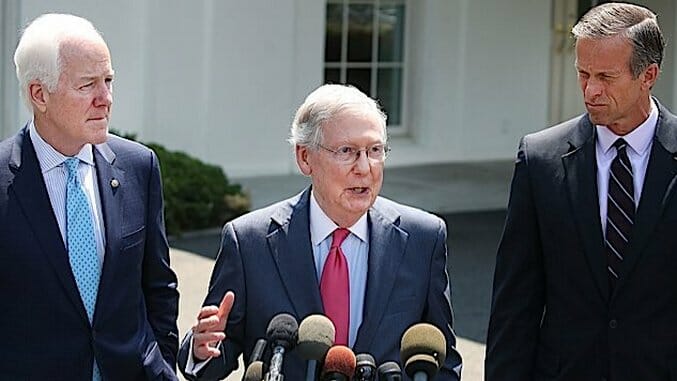If the Senate Actually Votes on the Health Care Debacle, We Need to Hit the Streets
Photo by Mark Wilson/Getty
Life, liberty, and the pursuit of happiness. These are the “unalienable rights” the United States is based upon, outlined in the Declaration of Independence we celebrated on July 4. The ability to live a healthy life, and therefore pursue freedom and happiness, is simply not possible without health, and if you have a terminal or diminishing disease, life is not possible without health care. In this carbon-polluted world, in a country where the King, the Clown, and the Colonel’s chains dominate food options for the poor, where drug prices and resources are sky high, a country where diseases are not cured because they’re too profitable, the absence of affordable high quality health care is a human right’s abuse. We must demand this right.
When the United Sates first voted for President Barack Obama, a candidate who very clearly campaigned around the issue of universal coverage, we voted for affordable health care for all Americans. But for almost nine years now, Congress has failed to push through this kind of progressive legislation. The Republican Party has obstructed health care bills, including the original drafts of Obamacare, that provide quality, affordable coverage for all Americans, while the Democrats have failed to show support for a truly universal plan in any meaningful way.
Instead, Congress avoided truly universal health coverage by making sure the insurance and medical providers sustained high profits while forcing average Americans to pick up the price tag, changes which eventually coalesced in the not-so-affordable, not-so-universal, unfair law that is the Affordable Care Act (ACA), otherwise known as Obamacare.
Now that we are faced with an even worse law—a hugely unpopular bill called the Better Care Reconciliation Act written by a dozen men behind closed doors that doesn’t come close to providing a better care alternative to even the ACA—we have to demand resolve based on our democratic inclinations.
Under this proposed bill, an estimated 22 million people will lose their health care coverage, according to the nonpartisan Congressional Budget Office. The mandate that demands all Americans have health care coverage will be gone, but with no established way to ensure that those people who are kicked off get the health care they need. The people who will lose their coverage just happen to be the poorest Americans who need it the most. The Better Care Reconciliation Act leaves it up to the private market to make health care affordable, but as we have seen before, this profit-centered model of insurance coverage will not provide inexpensive medical care for the 22 million people who will get the boot.
As if the assault on the poor wasn’t already center stage, social security would also be slashed by $600 billion over the next ten years, one of the biggest cuts in our country’s history. Fifteen million people would lose Medicaid coverage, disproportionately affecting seniors between the ages of 50 and 64. The oldest people, those over 65, would pay five times more on insurance exchanges than young people and 4 million older adults would lose their coverage by 2026.
But it won’t just be the elderly who are affected by this deep cut to social security, the poor and disabled would face similar defunding and diminished care while states would also have the option to request waivers so they don’t have to provide services for the mentally ill, including those addicted to drugs during the largest addiction epidemic in modern history. After they were criticized for the lack of opioid recovery funding, Republicans added $38 billion, a large amount of money still seen as inadequate by addiction professionals.
The bill will gut the programs we rely on when we need the social safety net to carry us through tough times will be degraded. Not only is this morally repugnant, social security is Article 22 in the United Nations’ Universal Declaration of Human Rights, and Trump repeatedly said he would not cut social security on the campaign trail. But that was when people who need it were supporting him.
While the proposed legislation makes seemingly heartless cuts to the social security benefits lower income Americans so desperately need, the Tax Policy Center estimates the bill would simultaneously decrease federal tax revenues by $700 billion over the next decade. $563 billion of it, according to the Congressional Budget Office score, would come from tax breaks over the next ten years for the richest one percent of Americans making $875,000 a year or more. After receiving so much criticism for this, Senate Republicans announced that the latest version of the bill will keep a 3.8 percent tax on those making $200,000 or more, which is not only inadequate, it does not pay for social security subsidies for people who need health care like even the ACA does.
-

-

-

-

-

-

-

-

-

-

-

-

-

-

-

-

-

-

-

-

-

-

-

-

-

-

-

-

-

-

-

-

-

-

-

-

-

-

-

-








































